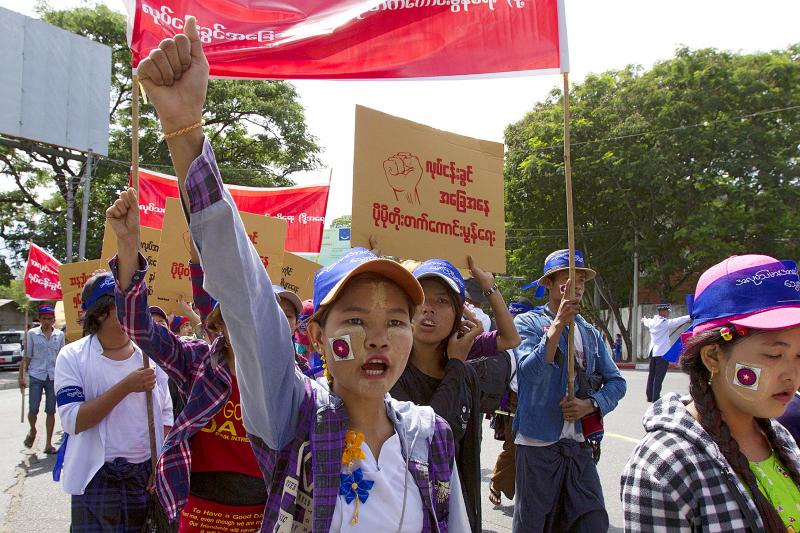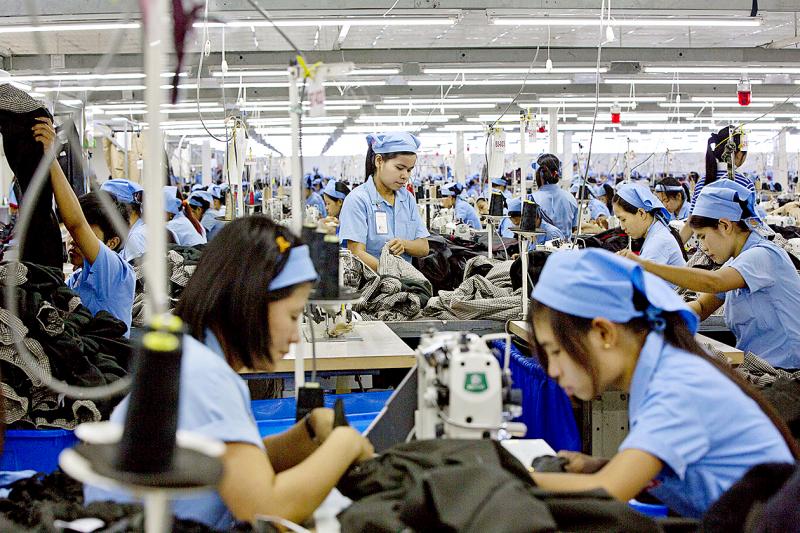At a garment factory on the outskirts of Myanmar’s biggest city, Zin Mar Htun has been working through the night — doing unpaid overtime in a desperate attempt to keep her job.
Myanmar’s clothing factories have cut more than 250,000 jobs since the military seized power in a Feb. 1 coup, unleashing economic turmoil and triggering sanctions against the ruling generals that anti-junta protesters want to see extended.
Trade unions, which have been at the fore of protests since the coup, are urging foreign fashion firms and governments to sever trade ties to pressure the military, though many low-paid garment workers like Zin Mar Htun fear they would pay the price.

Photo: AP
“It is possible to live and eat only because there are factories,” Zin Mar Htun said during a rare day off from sewing clothes at a plant that supplies European fashion labels.
“Without this job, I would become a beggar. I know nothing but sewing,” she said, adding that her monthly salary had dropped to 180,000 kyat, about US$100, since bosses stopped paying for overtime.
A survey of 400 workers — 290 from garment and shoe factories, some of them already unemployed — found 97 percent did not support the unions’ campaign for broader sanctions, according to the Workers’ Solidarity League of Burma, a nonprofit.

Photo: AP
Heeding the demands of unions and rights groups for tougher action, the European Parliament called in October for a swift review of EU trade benefits that helped Myanmar’s garment exports skyrocket over the last decade.
Aided by the bloc’s Everything But Arms (EBA) trade scheme, which allows tax-free exports from developing countries, the sector made up 30 percent of all exports in 2019, worth US$6.5 billion, and up from less than US$1 billion in 2011, UN data shows.
Critics say EBA status, which is granted to countries committed to protecting human rights, no longer applies to Myanmar following the death of an estimated 1,200 civilians since Feb. 1 and worsening labor conditions.
“The coup reversed the progress made during the democratization process, thereby undermining the conditions for granting EBA references,” the EU Parliament said in an Oct. 7 resolution.
RIGHTS ROLLBACK
Before the military deposed Nobel Laureate Aung San Suu Kyi, who was jailed last week on charges of incitement and breaching COVID-19 rules, Myanmar’s garment factories employed some 700,000 people — mostly young women supporting rural families.
Since the coup, union leaders from the sector have used established networks to mobilise workers in strikes and protests.
In a sector already reeling from the coronavirus pandemic, factory zones have been placed under martial law and attacked by arsonists, and unionists have been targeted as 10 years of hard-won labor rights are rolled back, labor campaigners said.
More than 250,000 jobs were lost in the first half of this year and hours were slashed by more than half for those who remained, according to the UN’s labor agency, the International Labour Organization (ILO).
In the economic and political chaos, the interests of some factory bosses and the military have aligned, campaigners said, citing reports of them collaborating to root out union leaders and other organizers.
“(Workers are) being dragged out of their homes in the middle of the night to be arrested and those in military or police custody are being brutally tortured even to the point of death,” global union IndustriALL wrote to the European Commission.
The military junta could not immediately be reached for comment.
The Geneva-based union federation has also backed a campaign by more than 180 Myanmar unions and civil society groups for foreign governments and companies to cut all economic ties with the country.
One of the campaign’s leaders, Khaing Zar Aung, president of the Industrial Workers Federation of Myanmar, said the potential for mass job losses was outweighed by the millions of people who were already “starving” due to the coup’s economic impact.
In April, the UN warned that up to 12 million people could be pushed into poverty by next year — levels not seen since 2005 — with Myanmar “on the brink of economic collapse.”
Khaing Zar Aung, also a central committee member of the Confederation of Trade Unions Myanmar, which she said voted unanimously in support of sanctions, dismissed the survey of 400 workers who were almost all against the measures.
“I can get 4,000 or 40,000 signatures of workers who agreed,” she said by phone from Germany, outlining plans to collect donations to support those put out of work if tougher sanctions come into force. “We are doing what we believe.”
’RACE TO THE BOTTOM’
But critics say deeper economic sanctions could do irreversible damage to the sector and put workers at further risk.
Fashion labels that have helped drive improvements in labor conditions would likely be among the first to pull out, said Richard Horsey, a former ILO representative in Myanmar. “Those brands that have higher standards would be stripped out of the market and it would become a race to the bottom,” he said.
Producers with less concern for labor rights would likely fill the vacuum, as Western labels shift production to competitors such as China, Cambodia or Bangladesh — a potential death knell for the industry, he said.
European labels H&M, Marks & Spencer and Primark said they were committed to Myanmar workers, as the Ethical Trade Initiative, a UK-based supply chain watchdog, conducts an assessment of current conditions in the country The report is due to be completed early next year.
“In the meantime, we remain committed to all orders and our current suppliers,” a Primark spokesperson said.
At the Roo Win factory in Yangon, which also supplies European fashion labels, lunch breaks have been slashed to 15 minutes, said Nyo Nyo Tan, a machine operator.
Staff are threatened and harassed if they fail to meet rising production targets, and union leaders and other dissenters had been fired by factory bosses, she added.
But she said working under deteriorating conditions was better than not working at all.
“We rely on (business from) other countries,” she said, adding that she was not aware of the sanctions campaign. “I would like to request that brands do not leave.”

Dissident artist Ai Weiwei’s (艾未未) famous return to the People’s Republic of China (PRC) has been overshadowed by the astonishing news of the latest arrests of senior military figures for “corruption,” but it is an interesting piece of news in its own right, though more for what Ai does not understand than for what he does. Ai simply lacks the reflective understanding that the loneliness and isolation he imagines are “European” are simply the joys of life as an expat. That goes both ways: “I love Taiwan!” say many still wet-behind-the-ears expats here, not realizing what they love is being an

Google unveiled an artificial intelligence tool Wednesday that its scientists said would help unravel the mysteries of the human genome — and could one day lead to new treatments for diseases. The deep learning model AlphaGenome was hailed by outside researchers as a “breakthrough” that would let scientists study and even simulate the roots of difficult-to-treat genetic diseases. While the first complete map of the human genome in 2003 “gave us the book of life, reading it remained a challenge,” Pushmeet Kohli, vice president of research at Google DeepMind, told journalists. “We have the text,” he said, which is a sequence of

Every now and then, even hardcore hikers like to sleep in, leave the heavy gear at home and just enjoy a relaxed half-day stroll in the mountains: no cold, no steep uphills, no pressure to walk a certain distance in a day. In the winter, the mild climate and lower elevations of the forests in Taiwan’s far south offer a number of easy escapes like this. A prime example is the river above Mudan Reservoir (牡丹水庫): with shallow water, gentle current, abundant wildlife and a complete lack of tourists, this walk is accessible to nearly everyone but still feels quite remote.

It’s a bold filmmaking choice to have a countdown clock on the screen for most of your movie. In the best-case scenario for a movie like Mercy, in which a Los Angeles detective has to prove his innocence to an artificial intelligence judge within said time limit, it heightens the tension. Who hasn’t gotten sweaty palms in, say, a Mission: Impossible movie when the bomb is ticking down and Tom Cruise still hasn’t cleared the building? Why not just extend it for the duration? Perhaps in a better movie it might have worked. Sadly in Mercy, it’s an ever-present reminder of just